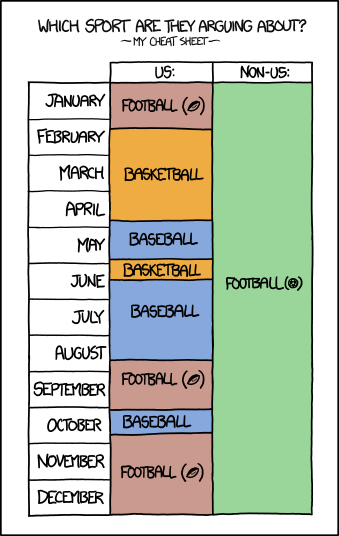Randall presents a "cheat sheet" which is a handy reference guide for something that is generally expected to be memorized or known by someone familiar with the knowledge domain. Cheat sheets are commonly used in mathematical applications to list important formulas or for measurement conversions; but they may also be used in other applications.
This cheat sheet allows Randall to figure out what sport other people are arguing over on the basis of the time of year and where the argument is occurring. The chart is based on the annual seasons (periods when the top professional and college leagues play) of each sport.
In the United States, the chart is divided among baseball, basketball and American football. Hockey is not shown, suggesting that he may not consider hockey a sport to compare with the three listed, he does not encounter arguments about hockey (of the four major professional sports leagues in North America, the NHL is significantly behind the others in terms of attention as its appeal is traditionally limited by geography to Canada and the northern United States), or that he perhaps does not need a chart to determine when the argument is about hockey (they may be obvious for countless reasons, including the physicality of typical hockey confrontations). Also, golf is not shown as well implying Randall may not think it's an important sport. The chart suggests that football is the most popular of the three sports, or at least more popular to argue about (of the four major professional sports leagues in North America, the NFL generally has the most attention).
The NFL football regular season generally runs from September to December with playoffs in January and early February. Overlapping this period of time, NCAA college football is also occurring, from September to December, with their bowl games in December and January. Almost all of this period, sports arguments are likely to be about football. The NBA basketball regular season runs from late October to mid-April with playoffs in April and into June. NCAA college basketball starts in November but peaks in March with the NCAA Basketball Tournament (March Madness). According to the chart, the arguments about basketball don't begin until the football season is over. They continue through the end of April, but start again at the end of May during the playoff finals. The MLB baseball regular season runs from April through September with playoffs in late September and October. When the baseball season begins, arguments shift from the ongoing basketball season to the new baseball season. As mentioned, the NBA Finals create some basketball arguments again for a few weeks. Similarly, the start of the NFL season in September makes it more likely arguments then will be about football. Baseball takes over briefly during the playoffs in October.
One of the punchlines is that outside the US, all sports arguments are about association football (soccer) all year round. The two types of football are noted on the chart by an icon showing the ball used in each sport. Of course, in reality, most countries have seasonal sports besides football, which may range from cricket to ice skating. However, non-American sporting events are unlikely to be brought up in the United States, and when they do it is very often association football as its active seasons are potentially long and overlapping (being played in both hemispheres and across most latitudes).
The title text continues on the theme of this chart being for someone who doesn't know anything about sports. Randall imagines a Twitter feed where you receive a salient sports opinion each day, presumably so that you could repeat the opinion to your friends and appear knowledgeable about sports. As the feed is for those uninformed about sports, there are clarifications of important terms in brackets.
The suggested Twitter message mentioned in the title text is accurate for the date of the comic. On September 11, 2012 the baseball team Boston Red Sox played the New York Yankees and won, 4 runs to 3. The Red Sox were already mathematically eliminated from the playoffs (meaning they needed to win more games than remained in the season to qualify). The Yankees were at the top of the standings, but were in a close race for the playoffs with the Baltimore Orioles (both teams had a win-loss record of 79 wins to 62 losses, with 21 games each remaining to play). To be guaranteed a spot in the playoffs, the Yankees had to win more of their remaining games than the Orioles. Losing to the Red Sox made this task harder. (For those wondering, both the Yankees and the Orioles made to the playoffs, but neither made it to the championship round, the World Series.)
Traditionally, the Red Sox and the Yankees have a long-standing rivalry, especially among fans. Many Red Sox fans consider a loss by the Yankees nearly as good as a win by the Red Sox (and the Red Sox beating the Yankees the best of both worlds). If the Red Sox can't win the World Series, then at least they can help prevent the Yankees from winning it.
For those with less interest in either depicted form of 'football', there are several other local or global varieties that could be discussed, as there are also other world-spanning sports that may provide a significantly seasonal or year-round interest for their adherents. From Randall's own perspective, however, they are perhaps unlikely to feature prominently enough in observed conversations to need mentioning in this simplified cheatsheet, or form the basis of useful 'opinion hints' along the lines of the baseball one. Other people, especially outside the US, could probably make use of significantly different versions (possibly still dominated by soccer, at least in the non-local scope).
This strip is one of several in which Randall attempts to trivialize sports (see for instance 904: Sports, 1480: Super Bowl, 1507: Metaball and 1859: Sports Knowledge).
